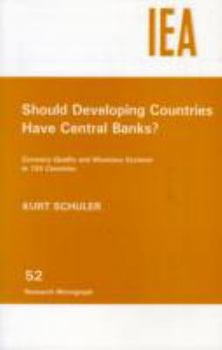Should Developing Countries Have Central Banks?: Currency Quality and Monetary Systems in 155 Countries
The IEA's publications have a reputation for challenging established ideas and Dr Kurt Schuler's research in central banking is in that tradition. In this field the conventional view is that every independent country should have its own central bank so that it can conduct an independent monetary policy. And on this basis many developing countries have established central banks. In this publication Schuler gathers evidence to determine whether or not...
Format:Paperback
Language:English
ISBN:0255363826
ISBN13:9780255363822
Release Date:July 1996
Publisher:Institute of Economic Affairs
Length:126 Pages
Dimensions:0.4" x 6.0" x 9.0"
Customer Reviews
1 rating
Interesting Question...Raises more questions than answers.
Published by Thriftbooks.com User , 22 years ago
Let me say at the outset that this is an excellent study by Kurt Schuler and there is nothing within the contents of the Research Monograph that I would find disagreement with. The question is why only four stars?The London based, free market Institute of Economic Affairs published this book in 1996. The timing is almost coincident with the Labour Chancellor of the Exchequer, Gordon Brown, granting semi-autonomy to the British central bank, the Bank of England. It is an interesting question in of itself about why the incoming Labour government should do this but not surprising given the failure of successive British governments to achieve low rates of inflation since the 1960s. However, I digress.The author looks at the history of central banks and their rise to prominence. He looks at their performance in general and examines their alternatives. He then moves on to eamine the relationship between central banking and currency quality which precedes the final section on improving currency quality in developing countries.This paper, examining as it does, 155 countries draws a clear conclusion that central banking in developing countries has performed worse in comparison to other monetary systems and in comparison to central banking in developed countries. I find no objection to that conclusion either.My reasons for giving this study four stars is that the conclusion itself is unsurprising. The economics of the study are fine. I do not disagree with the analysis of the various economic theories which are assessed. However, the case of central banking does take place within a political context and it is clear from the study that there is a correlation of the performance of central banks with the political system operating in a particular country and the openness of the economy of that country. Where there are democratic institutions and where the government has political legitimacy and, where there is freedom of political expression and a plurality of interest groups and, where the economy is open to free-ish trade and the holding of a country's assets outside of it's borders then the central bank performs well. Where those conditions are weakened then performance is poor often due to the tendency of ruling governments to try to appropriate a country's assests for themselves.This to me is of much greater significance than Dr. Schuler's paper. There is also a much more fundamental criticism, not dwelt on here of why we should even have central banks to begin with.However, this is an excellent paper and one which should be of interest to teachers and students of economics and international politics. I would seriously recommend this title to anyone intested in trade and politics.






